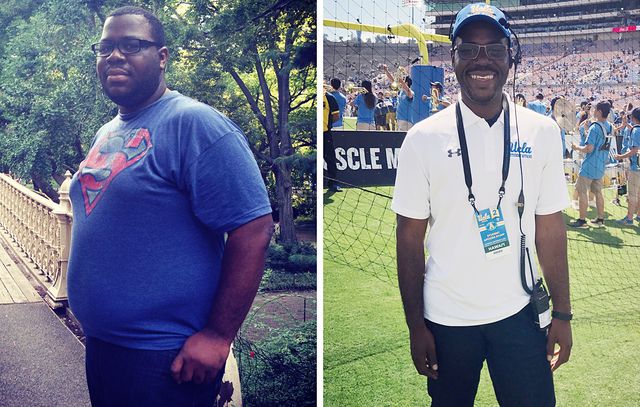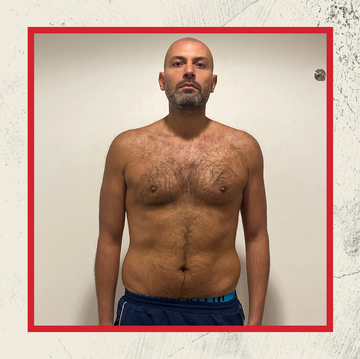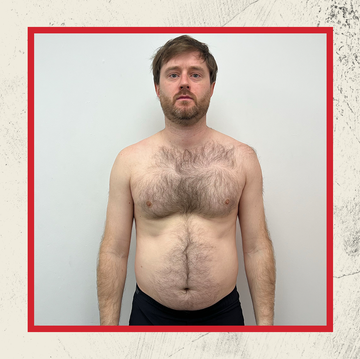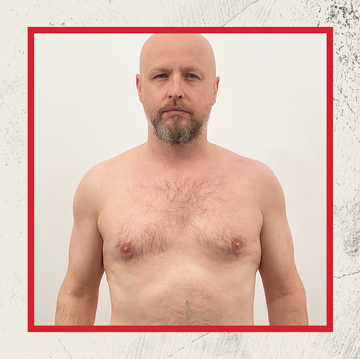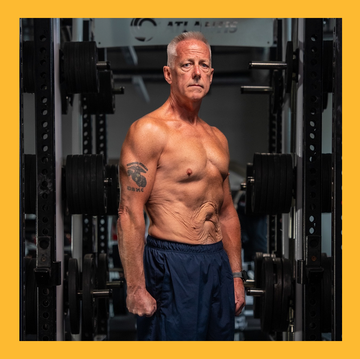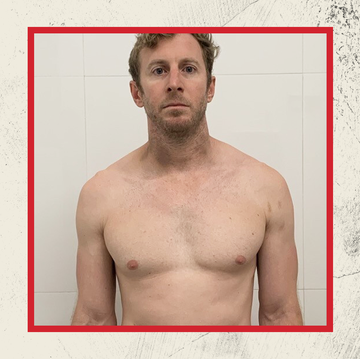DeVaughn King's family has a long history of obesity. In fact, four of his aunts and uncles died in one year from weight-related complications like diabetes and heart disease. Last year, King's doctor told him he too had developed diabetes. At 423 pounds, he knew his life was at risk.
"Finding out I had [adult-onset diabetes] was a huge wake up call that I had to make some changes," King says. "I couldn't just accept my weight and learn to live with it."
King grew up in the Bahamas where carbs, like white rice and macaroni, filled most of his plates, while the addition of vegetables didn't. But basketball, volleyball, and swimming were sports he loved to consistently play as a kid, so his poor diet didn't necessarily pack on the pounds right away.
When he stopped being so active in college, King noticed his clothes getting tighter.
"When I came to college in America, the portion sizes were much different, and I think that just kind of exacerbated it," King says. "And I was eating a lot of processed food, a lot of fast food, and a lot of instant things because I just needed or wanted something quickly."
After King's type 2 diabetes diagnosis in April 2016, he made a pact that he wouldn't get to the point where he had to have injections or take heart medication every day, so he turned to exercise.
"Moving [from Boston] to California was a huge impact on me because out here, everyone is active and there’s so much access to a lot of different things, so I started with things I could do naturally, like walking on paths and trails," he says. "The food and dieting came a bit after, but I wanted to get my body used to being active and moving again."
Soon, King started seeking out fitness classes in Los Angeles to get a feel for the workouts he enjoyed the most. That's when he found Barry's Bootcamp, a circuit training class, with personal trainer and instructor Astrid Swan.
"I fell in love with it," he says. "I always feel like I get a total workout. She doesn’t let me lose focus or get too comfortable, so I’m constantly challenged and never bored."
King started with just a couple of classes a week. Now, he trains five to seven days a week and he's made some major gains in the process. (Don't have time to hit the gym? You can build muscle right in your own home with the Metashred Extreme workout program from Men's Health.)
"Our workouts have been a progression of light cardio and bodyweight exercises to more HIIT with heavier weights and sprints on the treadmill," Swan says. "DeVaughn has great strength, and his cardio has improved tremendously. We are now focused on adding muscle and not being so concerned with looking at the scale."
King's favorite exercises include tricep dips, single-arm dumbbell curls, and pushups.
"How I measure my strength is through pushups, and those are weirdly becoming one of my favorites, because when I first started I could only do four in a minute. Now, I can do close to 30," he says.
King has also nearly tripled his deadlift. When he first started, he maxed out 160 pounds. Currently, he can lift 400. Thanks to his strength training, he says his upper-body has dramatically transformed.
Instantly Fix Your Deadlift:
In addition to ramping up his workouts, King turned his diet around as well. The change that made the biggest difference? He ditched the drive-thru, and started preparing his meals at home. Science backs him up on this one: According to a recent study in the International Journal of Behavioral Nutrition and Physical Activity, making your own meals can help you maintain a healthy weight.
Out of 11,000 people, those who cooked more than five meals a week at home were 28 percent less likely to be overweight and 24 percent less likely to have excess body fat than people who cooked fewer than three meals a week at home. What's more, people who ate home-cooked meals more often consumed more fruits and vegetables a day.
"Now I know what I’m putting into my body," King says. "Do I have days where I go out and have something fried? Yes, because I don’t think it’s realistic to live a completely regimented life 24/7. But 90 percent of the time, I’m very conscious about what I eat."
Here's what a typical day of eating looks like for King now: He starts his day with oatmeal, a boiled egg, and a fruit smoothie. Lunch is usually some kind of protein, greens, and brown rice. He keeps it light at dinner with a salad.
Paired with his workouts, these changes helped King shed 174 pounds in a year and a half, reversing his type 2 diabetes in the process. Currently at 249 pounds, the benefits go beyond a smaller pants size.
"Now I need to work out, because it makes me feel good and centered," King says.
That's why he believes exercise should be enjoyable. Take it step by step, he says, and recognize that your body needs time to adjust to a new lifestyle. Exercising should be fun, so finding something you can actually sustain is key.
"For the last year and a half, I’ve been doing this very consistently, and that’s because I found something that worked for me," King says. "I get to detach myself from the stress of the world and just be with myself."
